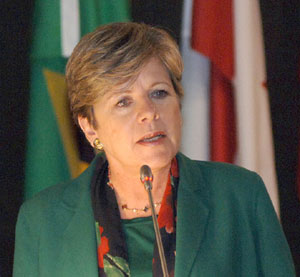ECLAC Highlights Policies for Low-carbon Economies
The Executive Secretary of the Commission suggested strategies for sustainable development in Latin American and Caribbean cities.

(9 April 2010) The Executive Secretary of the Economic Commission for Latin America and the Caribbean (ECLAC), Alicia Bárcena, highlighted the policies and strategies that may be adopted to eradicate sanitation and housing deficits in the region and promote low-carbon economies to contribute to sustainable development.
Bárcena participated in two sessions of the World Economic Forum for Latin America 2010 held in Cartagena, Colombia: "Eradicating Housing Deficits" and "Towards Low-Carbon Prosperity". She also met with the founder and Executive President of the World Economic Forum, Klaus Schwab.
The Executive Secretary set forth some of ECLAC's proposals for advancing towards low-carbon economies and implementing sustainable housing policies to ensure that land use and environmental concerns are addressed adequately.
In the session on low-carbon economies, Bárcena proposed supporting public-private partnerships in energy and infrastructure and fostering long-term fiscal strategies that consider the full cost of externalities caused by carbon emissions and using public expenditure to promote a low-carbon economy under fiscal sustainability criteria.
She also stressed the urgency to develop an energy and food security agreement as well as an international agreement on carbon emissions.
"Green strategies and policies should improve output and income and generate green jobs, which are generally intensive in high technology, better paid and highly productive. This could lead to an increase in the average total productivity of the whole economy," said Bárcena.
During the session on housing and sanitary deficits, ECLAC's Executive Secretary mentioned several alternative models for financing housing in the region and suggested the use of microfinance schemes as well as increasing social expenditures.
Implementing proactive policies is needed to prevent the spread of marginal neighborhoods in the region's cities, with a population of approximately 117 million, said Bárcena. These policies should include spatial, economic, social, environmental, political and cultural aspects, she added.
Some ways of developing sustainable housing policies in the region include implementing urban planning schemes that reduce the ecological footprint of cities, which would diminish greenhouse gas emissions, stated Bárcena.
She also stressed the need for an appropriate legal, financial and institutional base, especially to address the problems of the most vulnerable.
Lastly, Bárcena warned of the consequences of extreme climatic events to which the region is frequently exposed. "Earthquakes, tropical storms, hurricanes, floods, droughts and volcanic eruptions must be taken into account in urban planning," she said.
For more information, contact ECLAC's Information Services. Email: dpisantiago@cepal.org; telephone: (56-2) 210-2040/2149.
Country(ies)
- Latin America and the Caribbean
-
Colombia
Contact
Public Information Unit
- prensa@cepal.org
- (56 2) 2210 2040